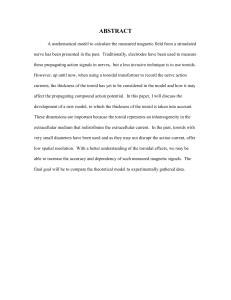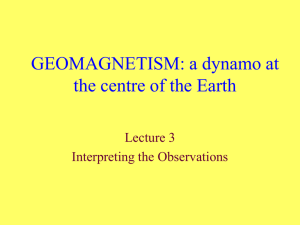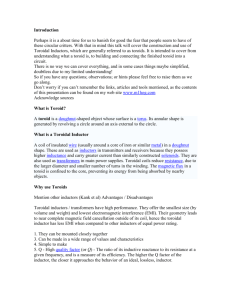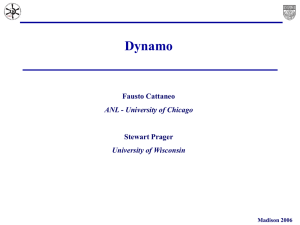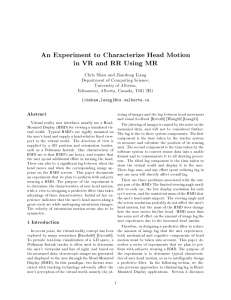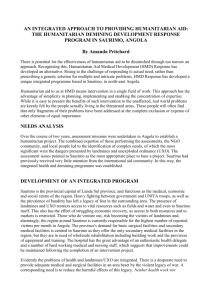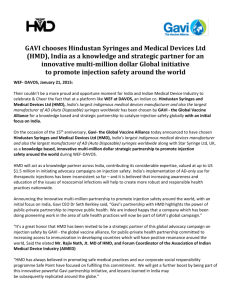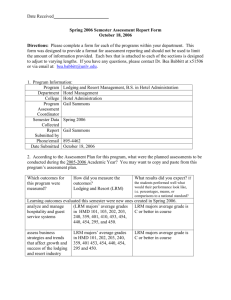Hydro Magnetic Dynamo: New Energy Solution
advertisement
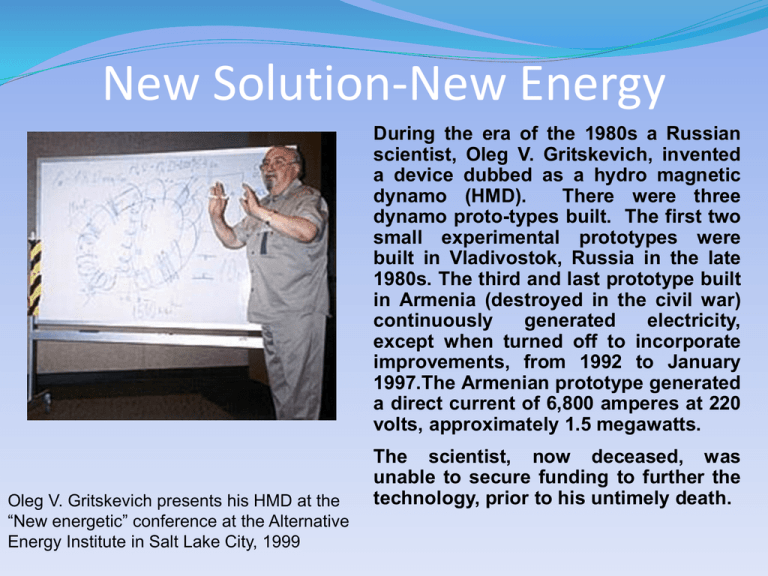
New Solution-New Energy During the era of the 1980s a Russian scientist, Oleg V. Gritskevich, invented a device dubbed as a hydro magnetic dynamo (HMD). There were three dynamo proto-types built. The first two small experimental prototypes were built in Vladivostok, Russia in the late 1980s. The third and last prototype built in Armenia (destroyed in the civil war) continuously generated electricity, except when turned off to incorporate improvements, from 1992 to January 1997.The Armenian prototype generated a direct current of 6,800 amperes at 220 volts, approximately 1.5 megawatts. Oleg V. Gritskevich presents his HMD at the “New energetic” conference at the Alternative Energy Institute in Salt Lake City, 1999 The scientist, now deceased, was unable to secure funding to further the technology, prior to his untimely death. Hydro-Magnetic Dynamo (HMD) The hydro-magnetic dynamo (HMD) is a largescaled emission-free electrical generator, which does not require external fueling. The source of the HMD’s huge electrical output is a nuclear reaction. The HMD produces alpha particles, which are helium nuclei made from fused deuterium, an isotope of hydrogen with one proton and one neutron. The electrons missing from the helium nuclei provide a copious “sink” of electricity, which provides the dynamo’s ability to generate an exceptionally large amount of electricity. It is also known that high-density charge clusters are created in the dynamo; these Polishing of internal surface of the HMD toroid at machining tool clusters are thought by theorists to be the basis of plasma-injected transmutation of elements in Armenia, 1991 and also the neutralization of radioactive materials. Unlike hot fusion and fission reactors, the HMD does not accumulate any radioactive components. Patent Description of the Technology The following is a condensed description of the Hydro Magnetic Dynamo taken from the original Russian patent. “The dynamo is a sealed toroid filled with distilled water with heavy water (deuterium oxide) added. The movement of water inside the toroid (closedloop) takes advantage of the unique properties of water as a polar liquid, which cause a release of electrical energy due to the rupture of hydrogen connections (bonds). Additional electrical energy is drawn from nuclear reactions and micro-cavitational HMD in protective plastic processes. The liquid, due to the movement in the toroid, is ionized with a magnetic field due to the “jacket”. stimulation of electromagnetic windings. A thin layer of electrical material covers the internal surfaces of the toroid. Thirty-two electrodes made from a hard-alloy material are inserted into the toroid at equal distances and are connected to a power supply. Additional stimulation windings are also connected to the power supply.” More Description of the Technology The creation of a magnetic field, due to the stimulation windings moves the water in one direction inside the toroid. An electromotive force is created by the electromagnetic induction in a separate set of windings. During the motion of the water with super low conductivity, electric potentials of high magnitude are generated due to friction and excitation of the coated layer on the inside surface of the toroid. These potentials create special form and magnitude of dynamical electrical gradients making possible transmutation of substances inside the toroid via low energy nuclear reactions (LENR) providing with more electromotive forces for the process. As result, copious amounts of excess electrical energy are generated than is required for electrical energy input. 2 Megawatt System Layout Toroid and Windings Cooling System Starting Device Capacitors Buffer Battery System System Economics The technology is self sustaining and produces no emissions, including air or nuclear. The process utilizes no fossil fuels and produces electricity, effectively and efficiently at substantially reduced costs to anything on the market. A well-run nuclear power plant can generate power at 1.5 cents/kilowatt-hour, coal 3.0 cents, natural gas 5.5 cents, and oil 6.0 cents, current cost average. Hydro Magnetic Dynamo’s operating cost will be approximately 0.1 cent/kilowatt-hour with no external fuel needed and no pollution! Life cycle: >10 years after each major maintenance cycle. Patents are supported in: •Russia •Australia •Singapore •Israel •Japan and valid patent application in Brazil. We are interested in long-term business relationship with a strategic partner/investor for development of this energy technology. It concerns not only the questions of financing but also of technical support, R&D staff, security, marketing etc. We are planning to spend 24 month on the R&D stage. The aim is to create 1-2 generators with the output of 1-5 MW during the time. The necessary investment for 2 years is about USD10 million. • We will be able to get profit and return the investment in the 3rd year of the project in case of selling the licenses – if it is reasonable in the situation at the moment. • Additional investments will be needed to organize production. If we produce and sell generators with the output till 5 MW in the amount of only 100 pieces a year, we will be able to return all the costs and get profit in the 5th year of the project. Contacts Sintos Systems OÜ (Estonia, reg. nr.10820589) Mr. Boris Gritskevich Phone +372 555 64 555 E-mail: hmdnewenergy@gmail.com, bobogri@yahoo.com Skype: bobogri
